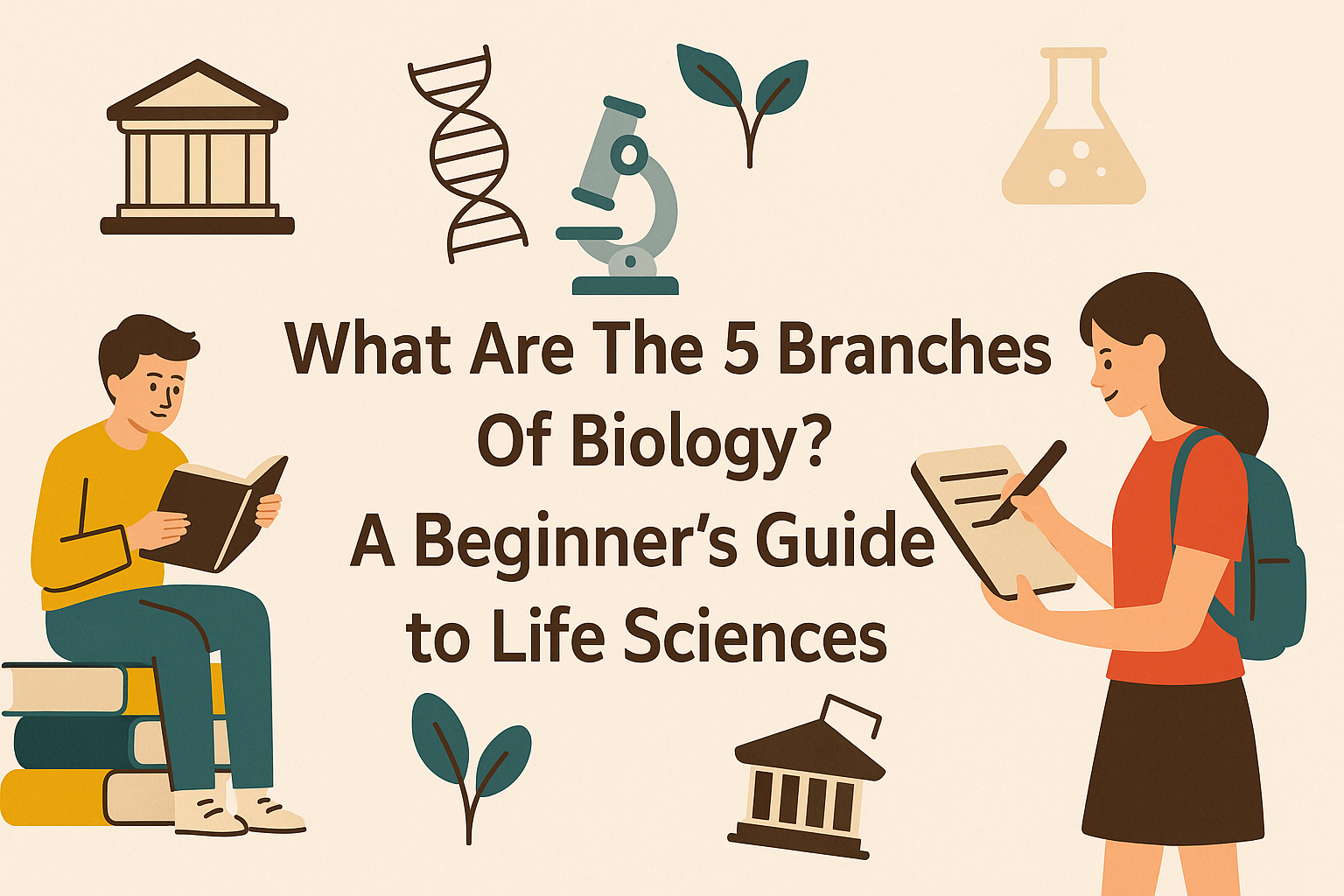What Are The 5 Branches Of Biology? A Beginner’s Guide to Life Sciences

Strong 8k brings an ultra-HD IPTV experience to your living room and your pocket.
Biology is the science of life—a field that explores the structure, function, growth, origin, evolution, and distribution of living organisms. Whether you're a budding scientist or a student just starting out, understanding the main branches of biology provides a strong foundation in life sciences. For students aiming to pursue careers in medicine, genetics, environmental conservation, or even biotechnology, having a solid grip on biology is essential. However, assignments in this field can be particularly challenging due to the technical depth and complex terminology. If you're feeling overwhelmed, seeking Help With Biology Assignment Australia can ease your academic stress and ensure you grasp the key concepts with expert guidance.
This beginner’s guide breaks down the five major branches of biology, highlighting their importance, applications, and how they shape our understanding of life.
The Five Major Branches of Biology Explained: From Plants to Ecosystems
1. Botany – The Study of Plants
Botany is the branch of biology that focuses on plant life. From microscopic algae to towering trees, botany explores how plants grow, reproduce, interact with their environment, and contribute to the ecosystem.
Key Areas in Botany:
- Plant Physiology: Understanding plant functions such as photosynthesis and nutrient absorption.
- Plant Taxonomy: Classification and naming of plant species.
- Plant Ecology: How plants interact with other organisms and their environment.
- Economic Botany: Study of plants that are beneficial to humans (e.g., medicinal herbs, crops, fibers).
Why Botany Matters:
Plants are the backbone of life on Earth. They produce oxygen, regulate carbon dioxide, form the base of most food chains, and offer raw materials for medicines, clothing, and shelter. With climate change and deforestation on the rise, botanists play a vital role in developing strategies for conservation and sustainable agriculture.
2. Zoology – The Study of Animals
Zoology is the branch dedicated to the study of animals, from single-celled protozoans to complex mammals. It delves into their anatomy, physiology, behavior, and habitats.
Sub-disciplines in Zoology:
- Ethology: Study of animal behavior in natural settings.
- Entomology: Focused on insects.
- Ornithology: Study of birds.
- Marine Biology: Concerned with ocean-dwelling organisms.
Why Zoology Is Important:
Animals are a critical part of Earth’s biodiversity. Studying them helps us understand ecological balance, the evolution of species, and the impacts of human activity on wildlife. Zoologists contribute to wildlife conservation, pest control, animal welfare, and even medical research through animal models.
3. Microbiology – The Study of Microscopic Life
Microbiology deals with organisms too small to be seen with the naked eye—such as bacteria, viruses, fungi, and protozoa. Though invisible, these tiny organisms have a massive impact on health, environment, and industry.
Core Fields in Microbiology:
- Bacteriology: Study of bacteria.
- Virology: Study of viruses.
- Mycology: Study of fungi.
- Parasitology: Study of parasites and their interactions with hosts.
Significance of Microbiology:
Microbes play a dual role—they can both benefit and harm living systems. They are involved in fermentation, medicine production (like antibiotics), waste decomposition, and biotechnology. On the flip side, they also cause infectious diseases. Microbiologists are at the forefront of understanding epidemics, developing vaccines, and innovating antimicrobial solutions.
4. Genetics – The Study of Heredity and Variation
Genetics is a fascinating branch that explores how traits are passed from one generation to the next. It explains everything from eye color to genetic disorders and forms the cornerstone of modern biology.
Fundamental Concepts in Genetics:
- DNA and RNA: Carriers of genetic information.
- Gene Expression: How genetic codes are translated into traits.
- Mutation: Changes in DNA sequence affecting organisms.
- Genetic Engineering: Altering genetic material for desired outcomes.
Why Genetics Matters:
Genetics has revolutionized fields like agriculture, medicine, and forensic science. Breakthroughs in gene editing (like CRISPR) offer new possibilities in treating hereditary diseases and improving crop resilience. Understanding genetics also helps identify cancer risks and paves the way for personalized medicine.
5. Ecology – The Study of Ecosystems and Interactions
Ecology examines how organisms interact with each other and their environment. It focuses on ecosystems, energy flow, nutrient cycles, and biodiversity.
Key Ecological Concepts:
- Ecosystem Dynamics: Relationships between organisms and their surroundings.
- Population Ecology: Changes in species population over time.
- Conservation Biology: Protecting endangered species and natural habitats.
- Climate Ecology: Studying the effects of climate change on ecosystems.
Importance of Ecology:
Ecologists provide essential insights into environmental issues such as pollution, deforestation, and global warming. Their research supports conservation policies, sustainability initiatives, and ecological restoration projects.
Interconnectedness of These Branches
Although each of these branches has its specific focus, they are not isolated. Modern biology is highly interdisciplinary. For example:
- A plant (botany) affected by a fungal disease (microbiology) might be studied for genetic resistance (genetics), which could influence its role in a larger ecosystem (ecology).
- Similarly, the behavior of an endangered species (zoology) may be examined in terms of habitat changes (ecology) and genetic diversity (genetics).
This interconnection highlights the beauty and complexity of life sciences. As a student, embracing this multidisciplinary approach helps you see the bigger picture of biological phenomena.
Real-Life Applications of Biology
Biology isn’t just theoretical; it’s a science deeply rooted in real-world applications:
- Healthcare: Developing vaccines, understanding diseases, genetic testing.
- Agriculture: Enhancing crop yields, pest control, sustainable farming.
- Environmental Science: Climate change modeling, pollution control, conservation.
- Biotechnology: Creating biofuels, cloning, pharmaceutical development.
- Forensics: Using DNA in criminal investigations.
As the world faces global health crises, food insecurity, and environmental degradation, biology plays a critical role in solving these challenges.
How Understanding Biology Helps Students
Studying biology sharpens your analytical thinking, problem-solving, and research skills. It enhances your understanding of the natural world and your place in it. For students in Australia, biology is often a required subject in high school and a core subject in many university degrees—especially in the fields of medicine, nursing, environmental science, and biochemistry.
However, due to its depth and breadth, many students find it difficult to keep up with biology coursework and assignments. That’s where expert academic support becomes essential.
Final Thoughts and Call to Action
The five branches of biology—botany, zoology, microbiology, genetics, and ecology—form the foundation of life sciences. Each one offers a unique lens through which we can explore the living world. By understanding these branches, students gain a comprehensive view of how life functions on every level, from molecules to ecosystems.
If you're a student struggling to navigate the complexities of biology, you’re not alone. Academic pressure, time constraints, and complicated concepts can make biology assignments feel daunting. That’s why seeking professional assistance is a smart move.
Looking for expert help with your biology assignments? Get personalised academic support tailored to Australian curriculum standards. Reach out to the team at New Assignment Help Australia today and make your biology learning journey smoother and more rewarding.
Note: IndiBlogHub features both user-submitted and editorial content. We do not verify third-party contributions. Read our Disclaimer and Privacy Policyfor details.



